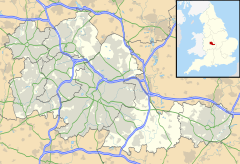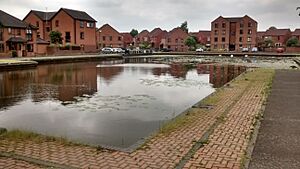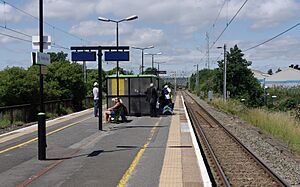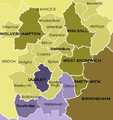Tipton facts for kids
Quick facts for kids Tipton |
|
|---|---|
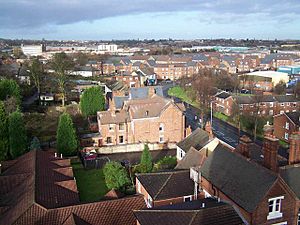 View from the tower of St Matthew's Church, looking north |
|
| Population | 38,777 (2011) |
| OS grid reference | SO9592 |
| Metropolitan borough |
|
| Metropolitan county | |
| Region | |
| Country | England |
| Sovereign state | United Kingdom |
| Post town | TIPTON |
| Postcode district | DY4 |
| Dialling code | 0121 |
| Police | West Midlands |
| Fire | West Midlands |
| Ambulance | West Midlands |
| EU Parliament | West Midlands |
| UK Parliament |
|
Tipton is a town in the West Midlands County in England. It's known for its history as an industrial town. In 2011, about 38,777 people lived there. Tipton is located northwest of Birmingham and southeast of Wolverhampton. It is also very close to other towns like Darlaston, Dudley, Wednesbury, and Bilston.
Historically, Tipton was part of Staffordshire. It includes smaller areas like Tipton Green, Ocker Hill, Dudley Port, Horseley Heath, and Great Bridge. Tipton used to have its own local government, but in 1974, it became part of the Sandwell Metropolitan Borough.
Contents
What's in a Name?
Tipton's name comes from an old Anglo-Saxon name, 'Tibba'. The second part, 'tun', is an Old English word meaning farm or settlement. So, Tipton means 'Tibba's estate'. The town was first recorded as Tibintone in the Domesday Book in 1086. The way we spell Tipton today started in the 1500s.
A Look Back in Time
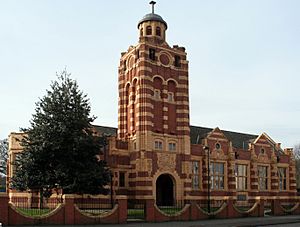
Before the 1700s, Tipton was just a group of small villages. But things changed when ironstone and coal were found there in the 1770s. This discovery led to a big boom in industry. Many canals and later railways were built, which helped the town grow even faster.
A famous inventor, James Watt, built his first steam engine in Tipton in the 1770s. It was used to pump water out of mines. In 1780, James Keir and Alexander Blair started a chemical factory in Tipton, making things like alkali and soap.
In 1801, a census showed that 4,280 adults lived in Tipton. Most people worked in iron making and mining. The town's population grew very quickly in the 1800s, from 4,000 to 30,000 people. Tipton became known as a key part of the "Black Country" because factory chimneys released a lot of smoke, and houses were built right next to factories. Today, most of these old industries have gone.
In 1922, a sad event called the Tipton Catastrophe happened. An explosion at a factory that was taking apart old World War I ammunition killed 19 girls and young women.
The Black Country Living Museum in nearby Dudley shows what life was like in the early 1900s. Many buildings there were moved from Tipton or are based on Tipton's history. Tipton was once called the Venice of the Midlands because of its many canals. Some canals were filled in during the 1960s and 1970s. Today, the paths along the remaining canals are great for cycling, walking, and enjoying nature.
From the late 1920s, new housing areas were built by the town council to replace older, less safe homes. These included the Shrubbery Estate, Tibbington Estate, Moat Farm Estate (nicknamed "Lost City"), and Glebefields Estate.
During Second World War (1939–1945), Tipton was bombed several times. In November 1940, three people died when a bomb hit Bloomfield Road. Later, in December 1940, 12 people were killed at a wedding party when an anti-aircraft shell fell down a chimney. In May 1941, six more people died in an air raid in New Road.
The last big council housing area built in Tipton was the Glebefields Estate in the early 1960s. Part of a canal was filled in to make space for it.
Local Work and Factories
Tipton was very important during the Industrial Revolution in the 1800s. Even earlier, in 1712, the world's first successful steam pumping engine was built here by Thomas Newcomen. You can see a full-size copy of this engine at the Black Country Living Museum.
In 1800, Tipton was mostly countryside with only a few coal mines. But then, many factories were built, and more coal mines were dug. By the end of the 1800s, Tipton was a busy industrial area. The town's population kept growing in the 1900s as new homes were built.
By the mid-1900s, coal mining had stopped in Tipton. Many factories also closed in the 1970s and 1980s, which led to more people being unemployed. However, living conditions in the town kept getting better.
Bean Cars, a company that made cars and lorry engines, had a factory in Tipton. Many old factory sites have since been used to build new homes.
Getting Around Tipton
The M5 motorway and M6 motorway pass near Tipton, making it easy to travel to other parts of the country.
Buses
Tipton has direct bus services to towns like Dudley, Walsall, West Bromwich, and Wednesbury. These buses run seven days a week.
Trains
Tipton has two railway stations: Tipton in the town centre and Dudley Port. Both stations are on the main train line from Birmingham New Street to Wolverhampton. This line is part of the West Coast Main Line.
Some old railway lines in Tipton have closed over the years. For example, the line from Walsall to Stourbridge closed in 1993. However, parts of this line are planned to re-open around 2023 for the West Midlands Metro tram service. New tram stops will include Great Bridge, Horseley Heath, and Dudley Port (Low Level).
Famous People from Tipton
Many interesting people have connections to Tipton:
- Alan Baker (born 1944) – a footballer.
- Scott Baker (born 1986) – a darts player.
- Steve Bull MBE (born 1965) – a famous footballer who played for Wolverhampton Wanderers and England. He started his career playing for Tipton Town.
- Yan Dhanda (born 1998) – a footballer for Swansea City.
- Jack Holden (athlete) (1907–2004) – a long-distance runner who competed in the Olympics. A garden in Tipton is named after him.
- William Perry (1819–1880) – a famous bare-knuckle boxer known as 'The Tipton Slasher'. There's a statue of him in Coronation Gardens.
- Margaret Macdonald Mackintosh (1864–1933) and Frances Macdonald (1873–1921) – artist sisters who were important in the Glasgow style of art.
Sports in Tipton
Tipton Town Football Club was formed in 1948. They made history in 2010-11 by reaching the first round of the FA Cup, a big football competition. Steve Bull, a famous footballer, played for Tipton Town before becoming a star.
The Sandwell Steelers are an American Football team that plays at the Tipton Sports Academy.
Media and News
For local news and TV, Tipton gets its signals from BBC West Midlands and ITV Central. Local radio stations include BBC Radio WM and Black Country Radio. The town is also served by local newspapers like the Dudley News and Express & Star.
Areas of Tipton
Tipton is made up of several smaller areas, or districts, including:
- Great Bridge
- Glebefields
- Dudley Port
- Horseley Heath
- Ocker Hill
- Moat Farm
- Princes End
- Tibbington
- Tipton Green
- Tividale Quays
- Toll End
Schools in Tipton
Tipton has several schools for different age groups.
Secondary Schools
- Q3 Academy Tipton (which has had different names over the years, like Tipton Grammar School)
- Gospel Oak School (formerly Willingsworth High School)
Some students from Tipton also attend schools in nearby areas like Dudley and Oldbury.
Primary Schools
Tipton has many primary schools, including:
- Tipton Green Junior School
- Victoria Infant School
- Summerhill Primary School
- Great Bridge Primary School
- Ocker Hill Infant and Nursery School
- Ocker Hill Junior School
- Glebefields Primary School
- Sacred Heart Primary School (a Roman Catholic school)
- Wednesbury Oak Primary School
- St Paul's Church of England Primary School
- St Martin's Church of England Primary School
- Joseph Turner Primary School
- Jubilee Park Primary School
- Burnt Tree Primary School
- Foxyards Primary School
Places of Worship
Tipton has several churches:
- Tipton Christian Church (a Pentecostal Church)
- Tipton Family Church (an Evangelical Christian fellowship)
- St Matthew's Church Tipton (a Church of England Evangelical church)
- St Marks Church Ocker Hill (a Church of England church)
Parks to Enjoy
- Jubilee Park – located on the Glebefields Estate.
- Victoria Park – in the Tipton Green area.
Images for kids
-
Tipton District Library, built in 1905. It's a Grade II listed building, meaning it's historically important.
See also
 In Spanish: Tipton para niños
In Spanish: Tipton para niños
 | Toni Morrison |
 | Barack Obama |
 | Martin Luther King Jr. |
 | Ralph Bunche |


